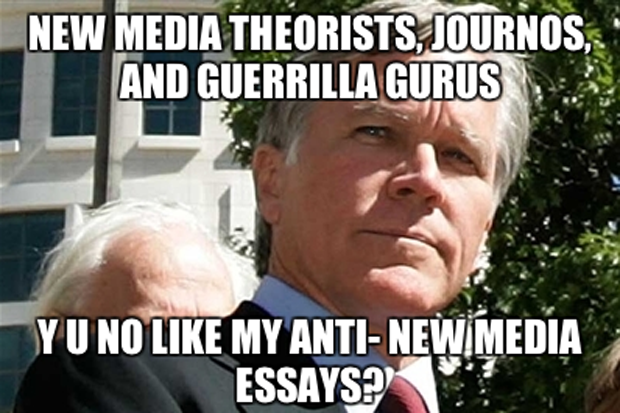
“All media work us over completely. They are so pervasive in their personal, political, economic, aesthetic, psychological, moral, ethical, and social consequences that they leave no part of us untouched, unaffected, unaltered. ” — Marshall McLuhan
“#TwitterMakesYouStupid. discuss” — Bill Keller
For someone so disdainful of the Internet, New York Times Executive Editor Bill Keller sure fits the textbook definition of a troll. His anti-aggregation screed “All the Aggregation That’s Fit to Aggregate” and today’s Twitter-bait “The Twitter Trap” have taken up a good chunk of my New York Times paywall quota. If that was his objective, then well done Bill Keller.
The part of me that wants people to be more clever than they actually are hopes Keller’s “First” column is an attempt to stir the blog fight waters. After all, attacking the entire Internet is definitely punching up. But sadly, instinct (and the fact that his reference to Twitter users as Twits is supposed to be funny but isn’t) tells me that this is not the case.
Says Keller:
“We are outsourcing our brains to the cloud. The upside is that this frees a lot of gray matter for important pursuits like FarmVille and “Real Housewives.”
But my inner worrywart wonders whether the new technologies overtaking us may be eroding characteristics that are essentially human: our ability to reflect, our pursuit of meaning, genuine empathy, a sense of community connected by something deeper than snark or political affinity.”
“The Internet Is Making Us Dumb” is the song that never ends, and was sung more beautifully than Keller by Nicholas Carr (Caveat: I’ve only read excerpts from Carr’s book, because yes I’m too busy tweeting and also because it is wrong). Essentially Keller is arguing that technologies like Twitter and Facebook make us less human, but seems to have conflated “human” with “old” “familiar to me.”
But I’ll go deeper than default snark for the moment.
Twitter is a tool. Like any tool you use it as you see fit, within constraints. Apologies to Marshall McLuhan, but arguing that a tool or a medium makes you a certain way (in this case less human) is a bit like arguing that the existence of supermarkets make people fat or that haikus make people brief. Yes, the supermarket makes it easier to buy the food that makes you fat, but how much of it you eat it is ultimately your choice.
Mediagazer Editor and media critic Megan McCarthy explains the conundrum thus, “Keller is being a bit hypocritical in complaining about how Twitter, and other technology, make us less able to connect because he keeps himself at arms length from it due to his own preconceived notions.”
Keller has decided to abstain from going to the supermarket, and is proclaiming thinness as a result.
Because of its opt-in follow system, Twitter allows us to make choices as to what information we consume, how we consume it and how we respond to it, within constraints. There are a plethora of anecdotes to support how Twitter and Facebook foster a greater sense of community and discussion, but let’s take today as an example: Because of Twitter I have read not just Keller’s piece, but read four incredibly insightful meta-media counterpoints to his argument.
Perhaps out of secondhand embarrassment, even Keller’s own employee Nick Bilton responded to his boss’ “#TwitterMakesUsStupid. discuss” tweet and subsequent treatise with an entire post arguing essentially that “stupid is as stupid does.”
“Could Twitter make me stupid? Absolutely. If I only followed funny cats that speak with poor grammar, I’d be on my way to a vapid state of mind in no time. But I don’t. I follow dozens of news outlets and writers; I follow chefs, neuroscientists and the president of the United States; and of course, I follow Mr. Keller.”
To his credit Mr.Keller replied, in the comments section, that his actual argument was not that Twitter makes you stupid, but that Twitter is “ill suited to real discussion.” I don’t think anyone would hold up this stream of tweets as a proud example of an enlightening colloquy,” Keller said, referring to the reaction to his post.
If Keller spent more time on social media, he’d understand that when it comes to the colloquy sparked by the Internet, what you see publicly posted on Twitter and Facebook is just the tip of the conversation iceburg. Thanks to Twitter and Facebook, I’ve now discussed The Twitter Trap privately (through DM) and publicly with multiple friends, colleagues and industry leaders whom I’ve both met and have yet to meet in person. And his experiment has certainly provided many bloggers with an easy opportunity to prove how well they write. ;)
In addition to all of the Keller analysis I’ve consumed and discussed, I’ve read Sheryl Sandberg’s epic Barnard commencement speech, found material for a news post (about Twitter) and planned a real life meeting with a startup founder (who I met on Twitter). I’ve faced a torrent of human connection and knowledge and I’m still in my pajamas.
Keller seems to forget that there are links at the end of some tweets, and those links lead to blog posts and newspaper articles and in the comments sections of those blog posts and newspaper articles you can find yes, real discussion. And definitely a lot more REAL DISCUSSION than in the comments section of Keller’s original post, which is currently closed.
Image: Bill Keller Meme Generator